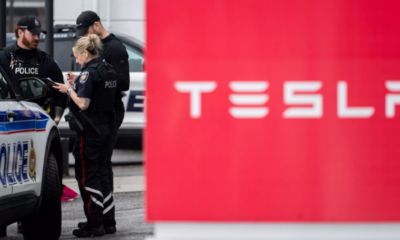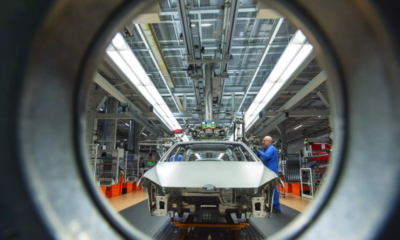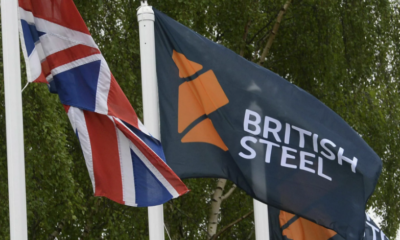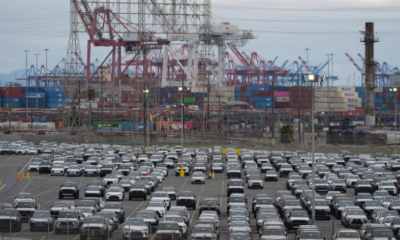Business
EDF Urged to Rethink Sizewell C Investment Amid Rising Costs and French Priorities
The future of Britain’s Sizewell C nuclear power project hangs in the balance after the French state auditor, Cour des Comptes, called on EDF to reconsider its commitment to the £40 billion (€47.42 billion) venture. The auditor has recommended EDF prioritize domestic nuclear projects over foreign investments, citing concerns about escalating costs and risks.
EDF’s Role and Financial Pressures
EDF, alongside the UK government, is a key backer of Sizewell C, with the government holding an 80% stake. The project, which began construction in January 2024, is now under scrutiny as EDF weighs its final investment decision. This comes against the backdrop of EDF’s costly involvement in Hinkley Point C, another UK nuclear project, which has faced delays and a ballooning budget.
Hinkley Point C, originally projected to cost significantly less, is now expected to require £45 billion (€53.3 billion), with operations delayed until after 2030. EDF has already written off €12.9 billion of its investment in the Somerset project, raising questions about its ability to support additional large-scale international projects like Sizewell C.
French Priorities
The Cour des Comptes has urged EDF to focus on ensuring the profitability and timely completion of domestic nuclear projects, which are central to bolstering France’s energy security. The auditor also advised the company to reduce its exposure to Hinkley Point C before committing further resources to Sizewell C.
Growing Opposition to Sizewell C
The Sizewell C project has faced mounting criticism, including environmental concerns and questions about its economic viability. Critics highlight the plant’s significant water requirements and the adequacy of its proposed sea defense systems, especially given climate-related challenges.
Anti-nuclear groups, including Together Against Sizewell C and Stop Sizewell C, have raised legal challenges over the project’s environmental impact. Concerns have been amplified by the allocation of £4 billion (€4.74 billion) of taxpayer funds toward the project, which activists argue is unjustifiable amid economic pressures.
Alison Downes, executive director of Stop Sizewell C, criticized the government’s continued support, stating, “Evidence is mounting that Sizewell C will be unaffordable and late. Ministers must come clean about its true cost. The continued secrecy around Sizewell C is inexcusable.”
Solicitor Rowan Smith, representing environmental campaigners, argued the project’s lack of a permanent water supply undermines its feasibility, noting that “Suffolk is in drought and has vulnerable habitats, which need to be protected.”
Uncertain Future
With EDF facing pressure to prioritize domestic interests and opposition to Sizewell C intensifying, the future of the project remains uncertain. Both EDF and Sizewell C representatives have yet to comment on the latest developments.
Business
Tesla Sales Drop 13% in Q1 Amid Weak Demand and Growing Competition
Tesla’s global sales fell by 13% in the first quarter of 2024, marking a significant decline for the electric vehicle giant as it struggles to maintain its market dominance. The drop in sales comes despite aggressive price cuts and promotional incentives, raising concerns about the company’s future performance.
Tesla reported 336,681 deliveries between January and March, down from 387,000 in the same period last year. Analysts had projected sales of around 408,000, making the shortfall even more pronounced. The disappointing figures signal potential trouble ahead for Tesla’s first-quarter earnings report, set to be released later this month.
Weak Demand and Market Challenges
Several factors are contributing to Tesla’s declining sales, including an aging vehicle lineup, increasing competition from rival automakers, and a shifting consumer sentiment. The company’s bestselling Model Y is reportedly due for an upgrade later this year, causing some buyers to hold off on purchases.
Market analysts also point to Tesla’s brand perception as a growing issue. Dan Ives, a senior analyst at Wedbush, highlighted soft demand in key markets like the U.S., China, and Europe. He attributed part of the decline to a “brand crisis” stemming from CEO Elon Musk’s public stance on political issues.
“The brand crisis issues are clearly having a negative impact on Tesla… there is no debate,” Ives said in a note to investors. “We knew the first-quarter figures would be bad, but they were even worse than expected.”
Tesla’s stock has fallen by nearly 50% since hitting a record high in mid-December. Some analysts had anticipated a boost in investor confidence due to expectations of favorable regulatory policies under a potential second Trump administration. However, those hopes have been overshadowed by concerns over the backlash against Musk’s leadership and its impact on Tesla’s customer base.
Rising Competition and EV Market Slowdown
The electric vehicle industry as a whole has seen a slowdown in sales growth, but Tesla has been particularly vulnerable to rising competition. Chinese automaker BYD, a major rival in the EV market, recently unveiled advanced battery technology that allows for ultra-fast charging, putting further pressure on Tesla’s market share.
In recent months, Tesla has aggressively cut prices and introduced incentives such as zero-interest financing to attract buyers. However, these efforts have not been enough to offset the slowdown.
The company’s struggles are reflected in the stock market as well, with Tesla shares slipping nearly 6% in early trading on Wednesday following the release of its delivery figures.
With Tesla’s first-quarter earnings report approaching, investors will be closely watching for further indications of how the company plans to navigate these growing challenges in an increasingly competitive EV market.
Business
Trump’s Tariffs on EU Goods Could Slash Exports by €85 Billion, Threatening Key Industries
The European Union faces a potential economic shock as former U.S. President Donald Trump prepares to announce sweeping tariffs on European goods, a move that could slash exports by at least €85 billion and severely impact key sectors such as automobiles and pharmaceuticals.
The new tariffs, expected to be as high as 20% on all EU imports, are part of a broader trade policy shift that Washington has dubbed “Liberation Day.” If enacted, the measures would escalate transatlantic trade tensions and deal a significant blow to Europe’s already fragile industrial economy.
Germany and Central Europe Face the Biggest Impact
The EU exported €382 billion worth of goods to the U.S. in 2024, making America its largest single export market, accounting for 12% of the bloc’s total external trade. The automotive industry—one of Europe’s most vital export sectors—stands to suffer the most.
EU vehicle exports to the U.S. reached €46.3 billion last year, and with the new tariffs adding to an existing 25% levy imposed in March, combined duties on European cars could climb to 45%. This increase threatens to make European vehicles uncompetitive in the U.S., leading to a near-collapse in shipments.
Germany, Slovakia, and Hungary are particularly vulnerable, given their heavy reliance on automotive exports. Germany’s key manufacturing hubs—including Stuttgart, Upper Bavaria, and Wolfsburg—could see substantial losses, impacting Mercedes-Benz, BMW, and Volkswagen.
Slovakia, home to Kia and Volkswagen plants, and Hungary, which hosts Audi’s production in Gyor, also face significant risks. Any slowdown in Germany’s automotive exports would disrupt Central Europe’s tightly integrated supplier network, further amplifying economic consequences.
Pharmaceutical Sector Also at Risk
Pharmaceuticals, the EU’s most profitable export category to the U.S., are another major target. In 2023, pharmaceutical exports to the U.S. generated record trade surpluses, with Ireland and Denmark leading the sector, thanks to the success of companies like Novo Nordisk.
However, reports suggest that Trump may impose a specific tariff on semaglutide—the active ingredient in Novo Nordisk’s best-selling weight-loss drug, Ozempic. Such a move could significantly impact Denmark’s pharmaceutical sector while giving an advantage to American competitors.
Potential Economic Fallout and ECB Response
Goldman Sachs analysts warn that the new tariffs could push the eurozone economy toward a slowdown, if not a full recession. In their baseline scenario, the average tariff on EU goods would rise from 7% to 20%, leading to a 0.7% reduction in the euro area’s GDP by the end of 2026.
A worst-case scenario—where additional U.S. adjustments to Europe’s value-added tax system increase tariffs to 43%—could trigger a 1.2% cumulative GDP loss and push the eurozone into a technical recession by 2025. Inflation is also expected to rise, with core inflation potentially peaking at 2.3%.
In response, the European Central Bank (ECB) is likely to implement monetary easing. Analysts expect the ECB to cut interest rates in April and June, with another 25-basis point cut in July, bringing the deposit rate down to 1.75% to counteract economic stagnation.
As the EU braces for the official tariff announcement, concerns are mounting over the broader implications for trade, investment, and geopolitical relations between Europe and the U.S.
Business
Economic Uncertainty Over US Tariffs Threatens Eurozone and UK Growth
Uncertainty surrounding US trade tariffs is set to cost the eurozone and UK economies billions over the next two years, according to a recent report by S&P Global. The potential economic fallout cannot be fully offset by increased defence spending, despite upcoming fiscal stimulus measures in Europe.
Eurozone Growth Downgraded Amid Trade Concerns
S&P Global’s latest economic forecast projects that the eurozone economy, valued at €14.6 trillion, will contract by 0.4% of GDP cumulatively in 2025 and 2026 due to trade-related uncertainty. Prior to the recent announcement of 25% tariffs on US car imports, the organization had already downgraded its eurozone growth expectations for 2025 from 1.2% to 0.9%.
Sylvain Broyer, Chief Economist for Europe, the Middle East, and Africa (EMEA) at S&P Global, emphasized that “uncertainty itself is likely to pose a greater risk to the European economy than the tariffs alone.”
While US tariffs could weaken economic recovery, there are some positive indicators. Fiscal stimulus measures in Germany and the broader EU could help drive eurozone GDP growth to 1.4% in 2026. Additionally, confidence in the region is improving due to falling inflation and interest rates, which are strengthening the labour market.
Potential Economic Impact of Tariffs
S&P Global considered multiple scenarios regarding the impact of US tariffs on the eurozone economy. In the worst-case scenario, where all EU exports to the US face a 25% tariff, eurozone GDP growth could be limited to 0.5% in 2025 and 1.2% in 2026.
Germany, heavily reliant on US car exports, would be particularly affected. Broyer noted that Germany’s exposure to US car markets is 1.5 times the European average, and tariffs could lower its economic output by 0.1% in 2025.
Despite these challenges, EU defence spending could provide some economic support. European governments are expected to increase defence budgets by 1% of GDP from 2026 onward, potentially boosting eurozone GDP by 0.1% in 2026, 0.2% in 2027, and 0.3% in 2028.
European Central Bank’s Expected Response
S&P Global anticipates that the European Central Bank (ECB) will cut interest rates once more in 2025, reducing the rate to 2.25% by mid-year. However, it expects the ECB to start raising rates again in the second half of 2026, with two hikes bringing the deposit facility rate to 2.75% by year-end.
Broyer warned that additional risks to the forecast include continued trade uncertainty, potential failures in executing fiscal plans, and economic slowdowns in the US due to rising import costs. However, stronger-than-expected fiscal stimulus could improve confidence and support growth.
UK Growth Forecast Cut Nearly in Half
The UK is also facing economic headwinds. Before the car tariff announcement, S&P Global had already lowered its UK growth forecast for 2025 from 1.5% to 0.8%, citing persistent inflation, weak export volumes, and restrictive monetary policy.
Marion Amiot, Chief UK Economist at S&P Global Ratings, highlighted that if the UK cannot avoid the newly imposed 25% tariffs on car exports to the US, it could face an additional 0.2% hit to GDP. “Car exports to the US are the largest source of bilateral goods trade surplus for the UK,” Amiot noted.
The UK’s export sector is struggling due to weak demand in Europe and China, as well as the strong value of the British pound. High energy and labour costs are also limiting competitiveness. “Energy prices are still twice as high today as they were before the energy crisis, so businesses have a lot to absorb,” Amiot explained.
The Bank of England’s Dilemma
The Bank of England (BoE) faces a challenging economic landscape. While businesses and investors are eager for interest rate cuts, inflation remains a key concern. In its latest meeting, the BoE kept its benchmark interest rate at 4.5%, despite inflation dropping to 2.8% in February.
S&P Global predicts that the BoE will lower rates to 4% by the third quarter of 2025, although it now expects one fewer rate cut than previously forecast. Inflationary pressures are likely to remain a constraint on monetary policy decisions.
Looking ahead, UK economic growth is expected to accelerate in 2026, with S&P Global projecting a 1.6% GDP increase. “Things are looking up for 2026, with regional growth picking up, interest rates cut by another 50 basis points, and inflation edging back to 2.5%,” the report concluded.
As trade tensions and policy uncertainty continue to shape economic conditions, both the eurozone and the UK must navigate a complex environment, balancing fiscal stimulus with monetary policy adjustments to maintain stability and growth.
-

 Business10 months ago
Business10 months agoSaudi Arabia’s Model for Sustainable Aviation Practices
-

 Business10 months ago
Business10 months agoRecent Developments in Small Business Taxes
-

 Politics10 months ago
Politics10 months agoWho was Ebrahim Raisi and his status in Iranian Politics?
-

 Business9 months ago
Business9 months agoCarrectly: Revolutionizing Car Care in Chicago
-

 Business9 months ago
Business9 months agoSaudi Arabia: Foreign Direct Investment Rises by 5.6% in Q1
-

 Technology10 months ago
Technology10 months agoComparing Apple Vision Pro and Meta Quest 3
-

 Politics10 months ago
Politics10 months agoIndonesia and Malaysia Call for Israel’s Compliance with ICJ Ruling on Gaza Offensive
-

 Technology10 months ago
Technology10 months agoRecent Developments in AI Ethics in America



























